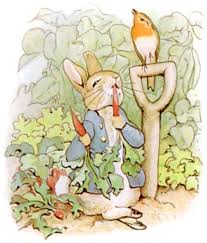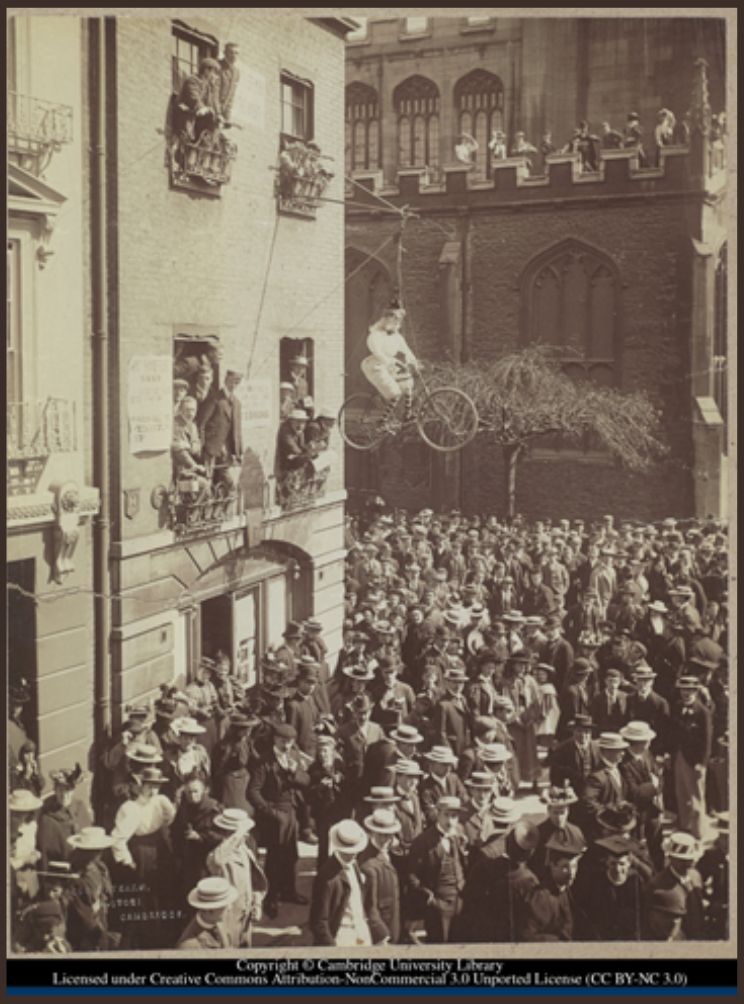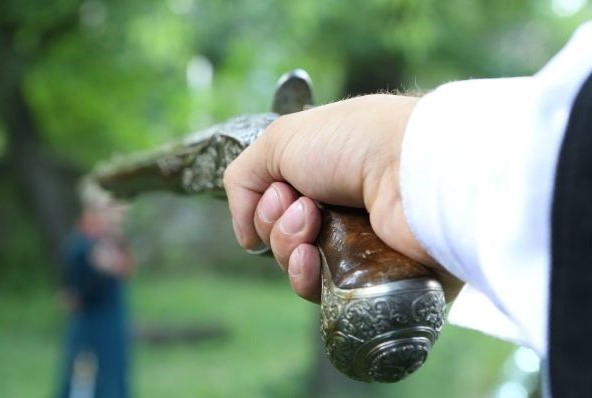In Good Company

In Good Company
‘Did Mr McGregor really eat my father?’
‘Hush,’ said Mrs Rabbit. ‘I’m going to the library. Run along, and don’t lose your new jacket!’
Peter waited until his mother had left, then he abandoned his clothes and lolloped down the lane to the gamekeeper’s cottage. He peeped through the window and saw Mellors with a lady. The two of them were as bare as Peter!
‘Theer on thy own, eh?’ asked the gamekeeper. Peter froze. The man must have seen him. But Mellors was not interested in the plump little rabbit. He only had eyes for Lady Chatterley, and that was dull, so Peter went on his way.
Further along, he came to a river, where a canoe was moored under the willows. Peter hopped closer. In the boat was a boy, lying on his back and smoking a pipe. Beside him was an axe. As Peter approached, the boy opened one eye and grinned.
I didn’t say she couldn’t sing

Do you like audiobooks? There is an increasing tendency to use AI for narration, but real human voices highlight meaning and nuance that an AI voice can never achieve.
Have a look at this scene in Pride and Prejudice:
[W]hen supper was over, singing was talked of, and [Elizabeth] had the mortification of seeing [her sister] Mary, after very little entreaty, preparing to oblige the company. By many significant looks and silent entreaties did she endeavour to prevent such a proof of complaisance [willingness to please],—but in vain; Mary would not understand them; such an opportunity of exhibiting was delightful to her, and she began her song. Elizabeth’s eyes were fixed on her, with most painful sensations; . . . Mary, on receiving amongst the thanks of the table the hint of a hope that she might be prevailed on to favour them again, after the pause of half a minute began another. Mary’s powers were by no means fitted for such a display; her voice was weak, and her manner affected. Elizabeth was in agonies . . . She looked at her father to entreat his interference, lest Mary should be singing all night. He took the hint, and, when Mary had finished her second song, said aloud,—
“That will do extremely well, child. You have delighted us long enough. Let the other young ladies have time to exhibit.”
Mary, though pretending not to hear, was somewhat disconcerted; and Elizabeth, sorry for her, and sorry for her father’s speech, was afraid her anxiety had done no good.’
Poor old Mary. And poor Elizabeth, who has been mortified by her family’s behaviour all evening. Mary’s singing and their father’s rebuke are the last straw.
And yet, if anyone had asked Elizabeth directly, she would have been reluctant to criticise her sister in public. Her reply might have been: I didn’t say she couldn’t sing.
What's in a name?

I wrote Crime and Prejudice as a pastiche, but what does that mean? The Oxford English Dictionary defines 'pastiche' as “the technique of incorporating distinctive elements of other works or styles in a literary composition”. In my case, the original whose style I wanted to emulate was Jane Austen’s Pride and Prejudice. That isn’t the only work I’ve referenced, however. The stories in Crime and Prejudice are full of allusions to other books and characters. Some of these would have been known to Jane Austen, but others are more recent. I included these allusions because I love following up such clues in the writing of other authors.
A dress fit for a queen

The chapter ‘A dress fit for a queen’ in my book Crime and Prejudice delves into the world of fashion – and Molly Houses.
Jane Austen took a practical interest in clothes and hairstyles. She wrote to her sister Cassandra, “I have made myself two or three caps to wear of evenings since I came home, and they save me a world of torment as to hairdressing, which at present gives me no trouble beyond washing and brushing, for my long hair is always plaited up out of sight, and my short hair curls well enough to want no papering. I have had it cut lately by Mr. Butler” (1 December 1798).
Her cap-making was obviously a success, because the following June she teased Cassandra: “I am quite pleased with Martha and Mrs. Lefroy for wanting the pattern of our caps, but I am not so well pleased with your giving it to them. Some wish, some prevailing wish, is necessary to the animation of everybody's mind, and in gratifying this you leave them to form some other which will not probably be half so innocent.”
Pugs and flower-beds: Jane Austen’s use of language

Those who write variations of Jane Austen’s novels often make a big effort to emulate her style. I certainly did, with my short story collection Crime and Prejudice. It matters especially to me, because I’m a bit of a language nerd, and my nerdery (there’s a new word!) led me to take a corpus linguistic approach. I’d published in that field before, as an academic, so now it was time to put what I knew into practice in the service of literature. Well, my own literature. And it was great fun.
But first, what is corpus linguistics, and why is there a picture of a skeleton at the bottom of the page? “Corpus” means “body”, and “linguistics” is the scientific study of language. Corpus linguistics therefore involves the creation of a body of text that can be analysed. For writers, this enables us to search for details such as which words are used frequently by a particular writer, or which characters in their books use certain words. For my own research for Crime and Prejudice, I downloaded all Jane Austen’s works from the wonderful Project Gutenberg website and created a simple Word document. Then I used the file to check if words I was unsure about actually appeared in Jane Austen’s novels.
Smuggling in Jane Austen's time

Five and twenty ponies,
Trotting through the dark -
Brandy for the Parson, 'Baccy for the Clerk.
Laces for a lady; letters for a spy,
Watch the wall my darling while the Gentlemen go by!
(Rudyard Kipling, A Smuggler's Song, 1906)
Kipling's poem was written in 1906, but it refers to the Georgian era, when taxes on imports were high and smuggling was rife. Many people turned a blind eye to the trade, often profiting from smuggled goods themselves. Susannah Fullerton tells us that at least half of the tea imported into England was obtained illegally. Normally, tea cost at least seven shillings a pound, but contraband tea could be bought by smugglers at seven pence a pound and sold for two shillings. That’s 24 pence – over three times the legal price. Tea merchants could not compete with these prices, so much of the tea they sold was of dubious origin. A case from the Old Bailey law court records of 1799 reports that William Strick was arrested in Cornwall for smuggling. His case was not tried in Cornwall, however, but in London. It was thought that no jury would dare to convict him in Cornwall, since the smuggling trade had such a hold.
Gambling in Regency times

When Jane Bennet in Pride and Prejudice learns that Mr. Wickham has debts of over a thousand pounds in Brighton, she is aghast. ‘“A gamester!” she cried. “This is wholly unexpected; I had not an idea of it.”’ Those less innocent than Jane, however, would not have been surprised at Wickham's debts. Gambling was a staple pastime of Regency society, and vast fortunes were lost at the gaming tables. The politician Charles Fox owed £140,000. That's around £31 million today. And Mr. Darcy paid Wickham's thousand pounds, amounting to roughly £87,000 now. Only love for Elizabeth could have induced him to do that.
Women gambled too. Georgiana, the Duchess of Devonshire, Charles Fox's friend and supporter, could lose in one evening an amount equivalent to twenty years of income for a gentleman such as Mr. Bennet.
Although gaming was largely illegal, this didn't prevent the gamers. Their punishment was generally in losing enormous sums of money, rather than being arrested, and the Old Bailey records between 1800 and 1830 do not show any prosecutions for gambling. Fraud, however, was a crime, and a gambler might be arrested for cheating.
One example from the Old Bailey in 1812 describes how Samuel Bathcot was cheated out of £10 by the Wheeler brothers.
Women at Cambridge

'I did not intend to start a riot,' says Elizabeth Darcy, at the start of my book Crime and Prejudice. Of course she didn't; she was agitating for women's education. Why shouldn't women like Elizabeth Darcy, Mary Anning the geologist, and Charles Darwin's cousin Caroline Wedgewood, be allowed to go to Cambridge University?
Undergraduate students at Cambridge each belong to a college, where they sleep, have meals and sometimes discuss their work with a specialist in their subject. There were no women's colleges at Cambridge in Jane Austen's time. The first, Girton, was founded in 1869; the second, Newnham, was founded in 1871. The third, New Hall, was not founded till 1954. Women were allowed to attend some lectures at Cambridge in the 1870s, and to sit for exams from 1881. In 1880, women presented a petition demanding the right to receive a degree, but it took another 17 years for a vote to be held, and the result was disastrous.
Duelling

"Are you looking at me?"
It didn't take much for a gentleman's honour to be challenged in Regency England, and once offended, the parties often resorted to a duel. Duelling in the UK was outlawed in 1819, but duels continued to be fought until 1852. The favoured weapons were pistols or swords. In theory, killing someone in a duel was counted as murder, and the winner was liable to the death penalty. In practice, a lot of leniency was upheld in sentencing.


